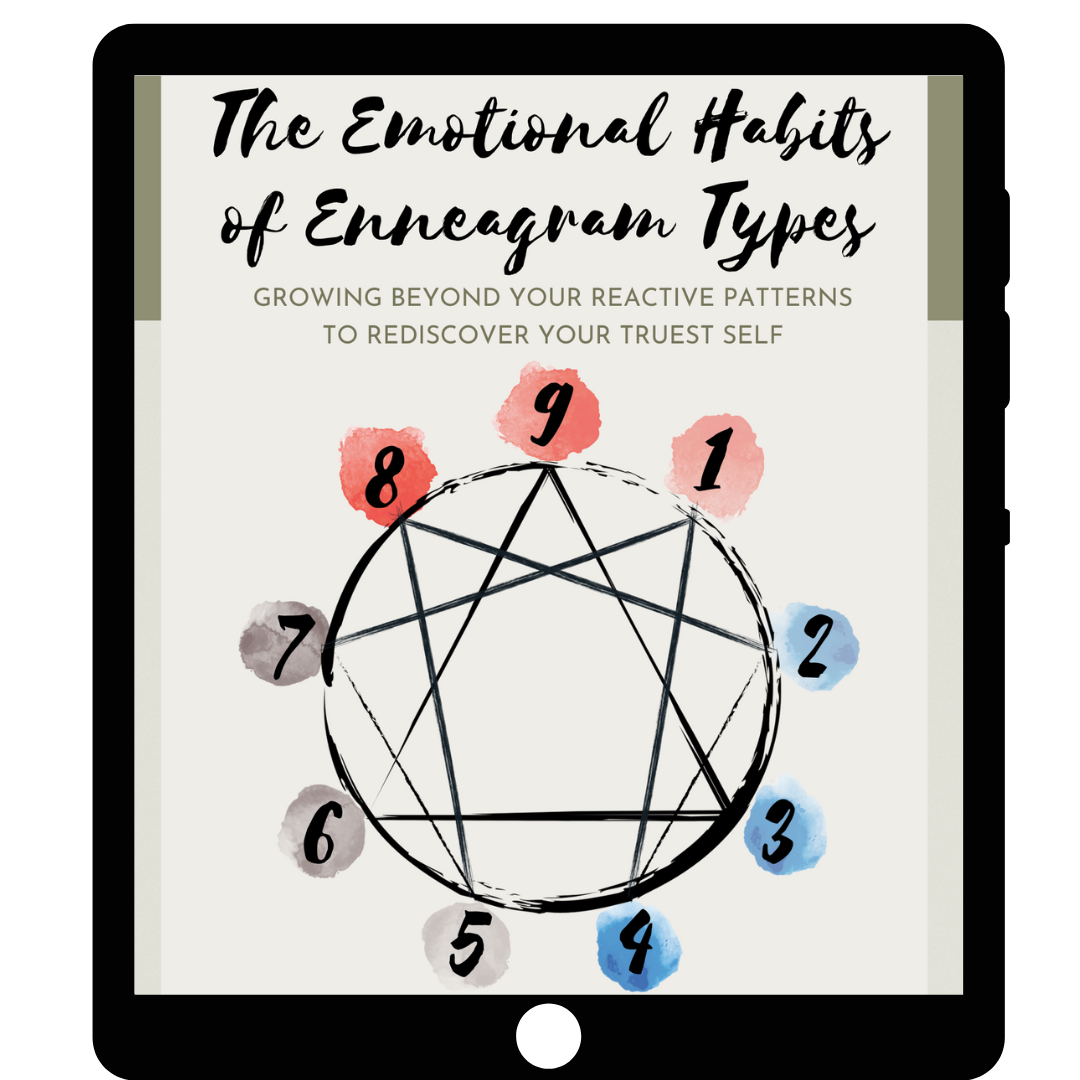How Brainspotting Can Improve Relationships
Human connections are the heart of our lives — offering some of our greatest insights, intimacy, growth, and joy.
But they can also be sources of our deepest pain, confusion, and conflict, especially when past wounds, unresolved emotions, or trauma subtly leak out out from our subterranean subconscious parts, warping the way we interpret new situations and respond to our loved ones.
Especially for people who feel deeply — Empaths, Highly Sensitive Persons (HSPs), and those with strong emotional intuitions like Enneagram Twos and Enneagram Fours — these relationship dynamics can be even more intense and all-consuming.
Fortunately, our amazing bodies come with inherent ways of healing itself. One such approach that has actually been created as a therapy approach is called Brainspotting.
Read more about what Brainspotting is or how Brainspotting works, so we can get to the juicy stuff about relationships here!
When Past Relationship Trauma Wounds Spill Over into the Present
Most people who reach out to me for therapy do so less to work on past traumas (especially from childhood), but because a CURRENT relationship is in crisis:
They can’t shake off the feeling that their current partner is cheating on them like their exes did, even though the partner has been nothing but present, truthful, and supportive.
They have intense reactions when their 2-year-old throws food onto the floor, and they’re so so frustrated but also don’t want to blow up on their kid for doing what 2-year-olds do
They feel constantly overlooked at work, but also don’t have the confidence to actually speak up for themselves for fear of criticism or judgment
They have a hard time opening up to others because they’re waiting for the shoe to drop and be abandoned by others or assume that every gift comes with strings attached
The likelihood that these reactions are based on old relationships and experiences are very very VERY high.
The pickle is when people KNOW they have old trauma to work with because they read all the books and even did therapy before, but they still have no idea how to actually move on or deal with their feelings (like Whack-a-Mole).
Even if you intellectually "know" something isn’t a threat anymore, your nervous system may still react as if it is.
This leads to emotional triggers in relationships. A partner’s raised voice, a delayed text, or a perceived rejection might set off old buried memories or emotions you’re not consciously aware of.
You may lash out, shut down, over-apologize, or spiral into anxiety — not because of what’s happening in the present moment, but because of the ghosts of unprocessed past experiences that are still reverberating in your nervous system.
Namely, your body brain can’t tell the difference between the past and present.
How Brainspotting Heals Old Wounds and Clearing Outdated Messages about Life & Love
For better or for worse, when intense feelings “leak out” (i.e., we get triggered), we have a window of opportunity to excavate those deeply buried memories (think of the colored core memory orbs in the movie Inside Out) that we don’t have conscious awareness of.
Brainspotting Therapy helps access and clear out those echoes by giving the brain space to process what it couldn’t before. It bypasses the analytical, thinking brain (top-brain) and goes straight to the root — the mammal/emotional mid-brain and lizard/reflexive root brain.
Brainspotting helps us locate those buried orbs, release the emotional charge, reconfigure those memories, and reorganize where those newly processed memories are stored.
By the end of the movie Inside Out, those intense, simplistic single-colored orbs (preprocessed memories) become more nuanced and complex multi-colored orbs (processed, integrated memories) that are much more useful in helping us navigate new experiences with greater wisdom and emotional balance.
It’s hard to describe Brainspotting because it can be such a body-based, nonverbal, primal experience, but here’s a blog that explains how Brainspotting actually works.
…or sometimes it’s easier to just try it for yourself. Actually, if you’re an Enneagram 4 or Highly Sensitive Person, you might already accidentally be doing Brainspotting yourself out of just sheer intuition.
How Brainspotting Helps Relationships
So how does healing old painful experiences actually translate into better, healthier, deeper relationships?
1. Healing Attachment Wounds
Most relationship struggles are rooted in early attachment patterns. If your caregivers were inconsistent, emotionally unavailable, overly controlling, or unpredictable, you may develop anxious, avoidant, or disorganized attachment styles.
These styles often play out in adult relationships—creating cycles of clinginess, withdrawal, fear of abandonment, difficulty with trust, or a strong need to "fix" others.
The Enneagram — a personality framework that I also specialize in — speaks to 9 different ways of seeing and responding to life experiences, including how we relate to other people. The Enneagram speaks to WHY we do what we do — our core needs, fears, and interpretations of life.
Think of the Enneagram revealing those painful muscle knots that put your whole body out of alignment and created other issues, and Brainspotting being the deep tissue massage to “work out” those knots so that you can gain full access to your whole body again.
Brainspotting does this “massage” by:
Uncovering and processing childhood attachment wounds from our deeper brains
Recalibrating our nervous systems to feel safe and steady again
Reorienting our views on life and relationships
Helping us bring our healing wins into daily experiences, so that you can actually access the hard won peace and courage
When you resolve your old ghosts of past wounds, you’re able to be present, see life, yourself, and others clearly for what they are, and to respond accordingly with all of your internal resources and strengths.
Instead of being bogged down by familiar fears, you’d have more clarity and boldness to fully show up in all areas of your life, including your relationships with loved ones!
2. Reducing Emotional Reactivity
Whether you like it or not, relationships are emotional mirrors. We’re constantly being triggered by others, often in ways that seem disproportionate.
A simple disagreement can feel like a betrayal.
A missed call can ignite panic or shame.
These reactions are signals that unprocessed emotions are driving the bus and that we need to resolve them sooner than later, lest they make hard things WORSE or even create MORE problems.
Because Brainspotting allows deep emotional processing without needing to "talk it all out", it helps:
Reduce intensity and frequency of emotional triggers
Soften trauma responses like fight, flight, freeze, or fawn
Increase emotional regulation and self-awareness
(Actually, did you know that you can do Brainspotting without ever saying a single word? The therapist doesn’t even need to know what exactly you’re processing, so it’s great for those mortifying memories that you feel deep shame around!)
What would happen if you were to buy yourself even 1-2 more seconds to slow your reactive roll? It might not seem like much, but even those few seconds might be the guardrails preventing you from sending that vitriolic email to your partner or boss.
What would it be like for you to feel like you’re in SELF-CONTROL, not OTHERS-CONTROLLED or OTHERS-CONTROLLING? How would your life be different if you led with calm wisdom, not chaotic panic?
3. Clearing OUTDATED, Unconscious Beliefs About Love, Worth, & Belonging
A lot of people I work with carry deep-seated beliefs like:
"I’m TOO MUCH."
"I’ll be abandoned if I express what I need."
"Love has to be EARNED."
"Conflict means rejection."
These beliefs aren’t just mental — they actually live in the body in the form of emotional reactivity. Brainspotting brings these belief/feeling capsules up to the surface so we can dispel their power.
Doing this creates an opportunity for you to bring in more realistic and healthier beliefs, such as:
"I can be fully myself and still be loved."
"My needs matter, independently of whether others can meet them."
"I don’t have to fix others to be worthy."
These internal shifts radically change how you can show up in your relationships. Even switching from an extremist, all-or-nothing perspective to a more nuanced one can do WONDERS in helping you navigate through different situations in your personal and professional relationships.
4. Improving Communication and Intimacy
When you're not overwhelmed by unresolved emotion or unconscious fear, you're more able to:
Speak your truth without wilting in shame or aggressively blaming
Hear others without getting defensive or flooded
Be vulnerable without shutting down
Set boundaries without guilt (this is a tough one, but you can do it!)
Not only does Brainspotting help you resolve painful experiences, but it can also help you access positive internal resources like peace, courage, and wisdom.
Because of this, Brainspotting strengthens your internal capacity to stay present and steady during difficult conversations or emotional moments, which expands your horizons as to what’s possible in your relationships: deeper intimacy, clarity, and mutual understanding — all without sacrificing yourself.
5. Reconnecting With Your Authentic Self
At its core, Brainspotting (and the Enneagram) isn’t just about healing trauma; it’s about coming home to yourself — your TRUE self.
When you clear out all the mental cobwebs and emotional clutter, you're able to reconnect with your inherent compassion, creativity, and wisdom.
This authentic self is the foundation of all healthy relationships, because you can’t have a relationship between two fragmented people.
Relationship math isn’t 1/4 + 3/4 = 1, but 1 + 1 = 1.
A WHOLE self with another WHOLE self creates a WHOLE relationship.
When both parties are free to be yourselves without the need to perform, people-please, or self-abandon, you can create vibrant, sustainable relationships that are resilient and immune to things like burnout or resentment.
In this way, Brainspotting supports not just relationship repair — but relationship revitalization. You’re no longer relating from old patterns, but from a place of wholeness, with endless possibilities of fulfilling experiences that help both of you feel seen, known, and loved — FULLY.
Why Brainspotting Works So Well for Sensitive People, Empaths, and Enneagram 2s & 4s.
For sensitive folks, traditional talk therapy can sometimes feel overwhelming, too surface-level, or too embarrassing (“Ahhhh — I don’t want someone else to see me like this!! What will the therapist think of me?”).
Another trap is that sometimes sensitive people mistake introspection with processing or resolution. You may understand your patterns intellectually but still feel stuck emotionally. Just because you have a LOT of feelings doesn’t mean you’re actually processing them!
Brainspotting honors your depth, while also making room for your WHOLE brain — thinking, feeling, and being. It doesn’t ask you to explain or rationalize your pain. Instead, it invites you to feel whatever comes up, notice it in your body, and release it in a safe, contained way.
It meets you where you live—in the emotional, sensory, intuitive spaces of the body and soul. So many of my clients who also have a very rich imaginary or spiritual inner world can easily weave them into their Brainspotting session!
There’s no one right way of doing Brainspotting, so the pressure’s off — give yourself permission to do feelings the way that works best for you & your sensitivity without getting lost in the depths! As the person sitting in the boat, the Brainspotting therapist can help pull you out when it’s time.
How to Start Brainspotting
If you're curious about trying Brainspotting to improve your relationships, here’s how to begin:
Find a Brainspotting practitioner in your state: Look for someone with training in trauma-informed care and relationship dynamics. If you’re in California, here are some fabulous Brainspotting therapists!
Clarify your intention: You don’t need to have it all figured out — just bring a specific emotional issue or pattern you’d like to work on. (If even that’s unclear, you can even say something like, “I don’t know why, but I just feel…’OFF’. Like there’s a fog around my head.” You’ll be surprised what Brainspotting can work with!
Stay open: Let your body lead. You may cry, yawn, feel sensations, or just be still. All responses are valid, and none of it needs to make sense (remember, we’re not using the analytical top-brain, but the dream-like emotional and lizard brains!).
Practice integration: After sessions, give yourself time to rest, reflect, and journal if needed. The work continues unfolding even after you leave the session, so if you have some more involved dreams afterwards, no problem — let your body continue to metabolize.
Brainspotting to Repair Your Relationship with Yourself First, then with Others
At its core, Brainspotting helps you heal the parts of yourself that were hurt in relationship and went into hiding (in Internal Family Systems, we call these the “Exiles”)— so you can thrive in connection with others.
By accessing the body’s wisdom, clearing out emotional blocks, and soothing your nervous system, Brainspotting helps you become more present, resilient, and open-hearted. You don’t have to stay stuck in old patterns or reactive cycles. Healing is totally possible.
That scary moment or relationship doesn’t have to hold you back anymore — instead, you can use your hard earned wisdom as a way to create the kind of relationship that has enough room for you and your needs, too.
With that healing comes a powerful ripple effect: deeper intimacy, healthier boundaries, more honest communication—and a profound return to love, both for yourself and for others.
Ready to Help Your Heart Heal?
What are your Enneagram type's emotional habits?
Grab this free guide that shows you how to grow beyond the patterns that keep you stuck!
Don't know your Enneagram type?
Find yours here!
© Copyright 2023 Joanne B. Kim. All rights reserved.
JOANNE B. KIM, LMFT
Joanne is a Licensed Marriage & Family Therapist and Certified Brainspotting Practitioner in San Jose, CA. She helps people EXHAUSTED by anxiety, shame, and an allergic reaction to anger create VIBRANT relationships where they matter, too.
Many of her clients are:
(1) the highly responsible, conscientious, and empathic types
(2) Enneagram Type Ones, Twos, Fours, or Nines
(3) Highly Sensitive Persons (HSPs)
The most common words spoken by those who’ve sat with Joanne:
“I thought it was just me. I’m NOT crazy!”
“I can finally figure out what to do with all these feelings!”















Struggling with emotional triggers or intimacy issues in your relationships because you were hurt in the past? Brainspotting is a powerful trauma therapy that helps you release past wounds stored in the body—so you can clearly see and effectively attend to each new person and moment clearly for what it is, instead of what your old trauma ghosts tell you they are.